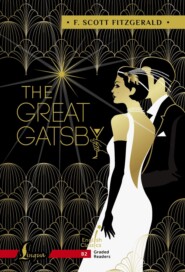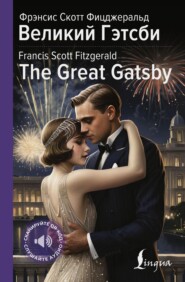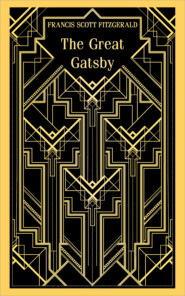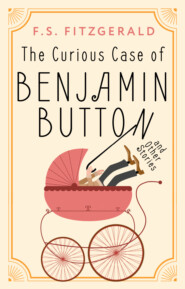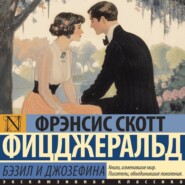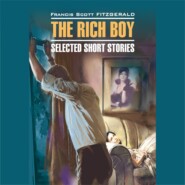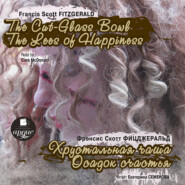По всем вопросам обращайтесь на: info@litportal.ru
(©) 2003-2025.
✖
Любимые повести на английском / Best Short Novels
Настройки чтения
Размер шрифта
Высота строк
Поля
Любимые повести на английском / Best Short Novels
Френсис Скотт Кэй Фицджеральд
Оскар Уайльд
Джон Голсуорси
Вашингтон Ирвинг
Н. А. Самуэльян
Бестселлер на все времена
Чтение оригинальных произведений – простой и действенный способ погрузиться в языковую среду и совершенствоваться в иностранном языке. Серия «Бестселлер на все времена» – это возможность улучшить свой английский, читая лучшие произведения англоязычных авторов, любимые миллионами читателей. Для лучшего понимания текста в книгу включены краткий словарь и комментарии, поясняющие языковые и лингвострановедческие вопросы, исторические и культурные реалии описываемой эпохи.
В этой книге собраны блистательные повести выдающихся мастеров англоязычной прозы – Оскара Уайльда, Фрэнсиса Скотта Фицджеральда, Вашингтона Ирвинга и Джона Голсуорси. Они не похожи одна на другую: это загадочная история о Сонной лощине и мистическое происшествие в Кентервильском имении, фантасмагорический сюжет с огромным алмазом и вдохновенный гимн жизни, любви и красоте. Но все они увлекут читателя оригинальным сюжетом и помогут улучшить свой английский.
Книга предназначена для тех, кто изучает английский язык на продолжающем или продвинутом уровне и стремится к его совершенствованию.
О. Уайльд, Ф. С. Фицджеральд Д. Голсуорси, В. Ирвинг / O. Wilde, F. S. Fitzgerald, J. Galsworthy, W. Irving
Любимые повести на английском / Best Short Novels
© ООО «Издательство «Эксмо», 2017
* * *
Читайте «Бестселлер на все времена» – погрузитесь в языковую среду с лучшими произведениями любимых авторов!
«Языковая компетенция – вещь капризная. Это как балет, как умение играть на музыкальном инструменте, как гимнастика, как любое действие, которое требует навыка. Либо вы идете вперед, либо начинаете сползать назад.
А самое главное – не прекращать изучение языка. Это может быть чтение оригинальной литературы. Любите читать про любовь – читайте про любовь, любите фантастику – читайте фантастику. Но читайте обязательно!»
Н. А. Бонк, лингвист, педагог,
автор наиболее популярных в России
учебников английского языка
Francis Scott Fitzgerald
The Diamond as Big as The Ritz
I
John T. Unger came from a family that had been well known in Hades[1 - Hades – Аид, в древнегреческой мифологии – подземное царство мертвых.] – a small town on the Mississippi River[2 - The Mississippi River – крупнейшая река в Северной Америке; Миссисипи вместе с притоком Миссури является самой длинной рекой в мире.] – for several generations.
John’s father had held the amateur golf championship through many a heated contest; Mrs. Unger was known ‘from hot-box to hot-bed,’ as the local phrase went, for her political addresses; and young John T. Unger, who had just turned sixteen, had danced all the latest dances from New York before he put on long trousers. And now, for a certain time, he was to be away from home. That respect for a New England[3 - New England – Новая Англия, регион на северо-востоке США, включающий в себя шесть штатов; назван так капитаном Смитом в 1614 г.] education which is the bane of all provincial places, which drains them yearly of their most promising young men, had seized upon his parents. Nothing would suit them but that he should go to St. Midas’[4 - Midas – Мидас, в греко-римской мифологии – царь Фригии, известный своей глупостью и жадностью.] School near Boston[5 - Boston – Бостон, город в США на северо-восточном побережье Атлантики в заливе Массачусетс.] – Hades was too small to hold their darling and gifted son.
Now in Hades – as you know if you ever have been there – the names of the more fashionable preparatory schools and colleges mean very little. The inhabitants have been so long out of the world that, though they make a show of keeping up to date in dress and manners and literature, they depend to a great extent on hearsay, and a function that in Hades would be considered elaborate would doubtless be hailed by a Chicago[6 - Chicago – Чикаго, крупный город на северо-западе штата Иллинойс.] – beef-princess as ‘perhaps a little tacky.’
John T. Unger was on the eve of departure. Mrs. Unger, with maternal fatuity, packed his trunks full of linen suits and electric fans, and Mr. Unger presented his son with an asbestos pocket-book stuffed with money.
‘Remember, you are always welcome here,’ he said. ‘You can be sure, boy, that we’ll keep the home fires burning.’
‘I know,’ answered John huskily.
‘Don’t forget who you are and where you come from,’ continued his father proudly, ‘and you can do nothing to harm you. You are an Unger – from Hades.’
So the old man and the young shook hands and John walked away with tears streaming from his eyes. Ten minutes later he had passed outside the city limits, and he stopped to glance back for the last time. Over the gates the old-fashioned Victorian[7 - Victorian – викторианский, относящийся к стилю в искусстве, архитектуре, литературе времен королевы Виктории (1837–1901).] motto seemed strangely attractive to him. His father had tried time and time again to have it changed to something with a little more push and verve about it, such as ‘Hades – Your Opportunity,’ or else a plain ‘Welcome’ sign set over a hearty handshake pricked out in electric lights. The old motto was a little depressing, Mr. Unger had thought – but now…
So John took his look and then set his face resolutely toward his destination. And, as he turned away, the lights of Hades against the sky seemed full of a warm and passionate beauty.
St. Midas’ School is half an hour from Boston in a Rolls-Pierce motorcar. The actual distance will never be known, for no one, except John T. Unger, had ever arrived there save in a Rolls-Pierce and probably no one ever will again. St. Midas’ is the most expensive and the most exclusive boys’ preparatory school[8 - Preparatory school – в США – частная школа, в которой учеников готовят к поступлению в колледж.] in the world.
John’s first two years there passed pleasantly. The fathers of all the boys were money-kings and John spent his summers visiting at fashionable resorts. While he was very fond of all the boys he visited, their fathers struck him as being much of a piece, and in his boyish way he often wondered at their exceeding sameness. When he told them where his home was they would ask jovially, ‘Pretty hot down there?’ and John would muster a faint smile and answer, ‘It certainly is.’ His response would have been heartier had they not all made this joke – at best varying it with, ‘Is it hot enough for you down there?’ which he hated just as much.
In the middle of his second year at school, a quiet, handsome boy named Percy Washington had been put in John’s form. The newcomer was pleasant in his manner and exceedingly well dressed even for St. Midas’, but for some reason he kept aloof from the other boys. The only person with whom he was intimate was John T. Unger, but even to John he was entirely uncommunicative concerning his home or his family. That he was wealthy went without saying, but beyond a few such deductions John knew little of his friend, so it promised rich confectionery for his curiosity when Percy invited him to spend the summer at his home ‘in the West.’ He accepted, without hesitation.
It was only when they were in the train that Percy became, for the first time, rather communicative. One day while they were eating lunch in the dining-car and discussing the imperfect characters of several of the boys at school, Percy suddenly changed his tone and made an abrupt remark.
‘My father,’ he said, ‘is by far the richest man in the world.’
‘Oh,’ said John, politely. He could think of no answer to make to this confidence. He considered ‘That’s very nice,’ but it sounded hollow and was on the point of saying, ‘Really?’ but refrained since it would seem to question Percy’s statement. And such an astounding statement could scarcely be questioned.
‘By far the richest,’ repeated Percy.
‘I was reading in the ‘World Almanac,’’ began John, ‘that there was one man in America with an income of over five million a year and four men with incomes of over three million a year, and – ’
‘Oh, they’re nothing.’ Percy’s mouth was a half-moon of scorn. ‘Catchpenny capitalists, financial small-fry, petty merchants and money-lenders. My father could buy them out and not know he’d done it.’
‘But how does he – ’
‘Why haven’t they put down his income tax? Because he doesn’t pay any. At least he pays a little one – but he doesn’t pay any on his real income.’
‘He must be very rich,’ said John simply. ‘I’m glad. I like very rich people.
‘The richer a fella is, the better I like him.’ There was a look of passionate frankness upon his dark face. ‘I visited the Schnlitzer-Murphys last Easter. Vivian Schnlitzer-Murphy had rubies as big as hen’s eggs, and sapphires that were like globes with lights inside them – ’
‘I love jewels,’ agreed Percy enthusiastically. ‘Of course I wouldn’t want any one at school to know about it, but I’ve got quite a collection myself. I used to collect them instead of stamps.’
‘And diamonds,’ continued John eagerly. ‘The Schnlit-zer-Murphys had diamonds as big as walnuts – ’
‘That’s nothing.’ Percy had leaned forward and dropped his voice to a low whisper. ‘That’s nothing at all. My father has a diamond bigger than the Ritz-Carlton Hotel.[9 - The Ritz Carlton Hotel – роскошный отель «Ритц-Карлтон». Сезар Ритц (1850–1918) создал сеть отелей, включая отель «Ритц» в Париже (1898) и «Ритц-Карлтон» в Лондоне (1906).]’
II
The Montana[10 - Montana – штат в США на границе с Канадой.] sunset lay between two mountains like a gigantic bruise from which dark arteries spread themselves over a poisoned sky. An immense distance under the sky crouched the village of Fish, minute, dismal, and forgotten. There were twelve men, so it was said, in the village of Fish, twelve somber and inexplicable souls who sucked a lean milk from the almost literally bare rock upon which a mysterious populatory force had begotten them. They had become a race apart, these twelve men of Fish, like some species developed by an early whim of nature, which on second thought had abandoned them to struggle and extermination.
Out of the blue-black bruise in the distance crept a long line of moving lights upon the desolation of the land, and the twelve men of Fish gathered like ghosts at the shanty depot to watch the passing of the seven o’clock train, the Transcontinental Express from Chicago. Six times or so a year the Transcontinental Express, through some inconceivable jurisdiction, stopped at the village of Fish, and when this occurred a figure or so would disembark, mount into a buggy that always appeared from out of the dusk, and drive off toward the bruised sunset. The observation of this pointless and preposterous phenomenon had become a sort of cult among the men of Fish. To observe, that was all; there remained in them none of the vital quality of illusion which would make them wonder or speculate, else a religion might have grown up around these mysterious visitations. But the men of Fish were beyond all religion – the barest and most savage tenets of even Christianity could gain no foothold on that barren rock – so there was no altar, no priest, no sacrifice; only each night at seven the silent concourse by the shanty depot, a congregation who lifted up a prayer of dim, anaemic wonder.
On this June night, the Great Brakeman,[11 - Brakeman – в США – тормозной кондуктор на железной дороге.] whom, had they deified any one, they might well have chosen as their celestial protagonist,[12 - Protagonist – главное действующее лицо в пьесе, литературном произведении или реальном жизненном событии.] had ordained that the seven o’clock train should leave its human (or inhuman) deposit at Fish. At two minutes after seven Percy Washington and John T. Unger disembarked, hurried past the spellbound, the agape, the fearsome eyes of the twelve men of Fish, mounted into a buggy which had obviously appeared from nowhere, and drove away.
Френсис Скотт Кэй Фицджеральд
Оскар Уайльд
Джон Голсуорси
Вашингтон Ирвинг
Н. А. Самуэльян
Бестселлер на все времена
Чтение оригинальных произведений – простой и действенный способ погрузиться в языковую среду и совершенствоваться в иностранном языке. Серия «Бестселлер на все времена» – это возможность улучшить свой английский, читая лучшие произведения англоязычных авторов, любимые миллионами читателей. Для лучшего понимания текста в книгу включены краткий словарь и комментарии, поясняющие языковые и лингвострановедческие вопросы, исторические и культурные реалии описываемой эпохи.
В этой книге собраны блистательные повести выдающихся мастеров англоязычной прозы – Оскара Уайльда, Фрэнсиса Скотта Фицджеральда, Вашингтона Ирвинга и Джона Голсуорси. Они не похожи одна на другую: это загадочная история о Сонной лощине и мистическое происшествие в Кентервильском имении, фантасмагорический сюжет с огромным алмазом и вдохновенный гимн жизни, любви и красоте. Но все они увлекут читателя оригинальным сюжетом и помогут улучшить свой английский.
Книга предназначена для тех, кто изучает английский язык на продолжающем или продвинутом уровне и стремится к его совершенствованию.
О. Уайльд, Ф. С. Фицджеральд Д. Голсуорси, В. Ирвинг / O. Wilde, F. S. Fitzgerald, J. Galsworthy, W. Irving
Любимые повести на английском / Best Short Novels
© ООО «Издательство «Эксмо», 2017
* * *
Читайте «Бестселлер на все времена» – погрузитесь в языковую среду с лучшими произведениями любимых авторов!
«Языковая компетенция – вещь капризная. Это как балет, как умение играть на музыкальном инструменте, как гимнастика, как любое действие, которое требует навыка. Либо вы идете вперед, либо начинаете сползать назад.
А самое главное – не прекращать изучение языка. Это может быть чтение оригинальной литературы. Любите читать про любовь – читайте про любовь, любите фантастику – читайте фантастику. Но читайте обязательно!»
Н. А. Бонк, лингвист, педагог,
автор наиболее популярных в России
учебников английского языка
Francis Scott Fitzgerald
The Diamond as Big as The Ritz
I
John T. Unger came from a family that had been well known in Hades[1 - Hades – Аид, в древнегреческой мифологии – подземное царство мертвых.] – a small town on the Mississippi River[2 - The Mississippi River – крупнейшая река в Северной Америке; Миссисипи вместе с притоком Миссури является самой длинной рекой в мире.] – for several generations.
John’s father had held the amateur golf championship through many a heated contest; Mrs. Unger was known ‘from hot-box to hot-bed,’ as the local phrase went, for her political addresses; and young John T. Unger, who had just turned sixteen, had danced all the latest dances from New York before he put on long trousers. And now, for a certain time, he was to be away from home. That respect for a New England[3 - New England – Новая Англия, регион на северо-востоке США, включающий в себя шесть штатов; назван так капитаном Смитом в 1614 г.] education which is the bane of all provincial places, which drains them yearly of their most promising young men, had seized upon his parents. Nothing would suit them but that he should go to St. Midas’[4 - Midas – Мидас, в греко-римской мифологии – царь Фригии, известный своей глупостью и жадностью.] School near Boston[5 - Boston – Бостон, город в США на северо-восточном побережье Атлантики в заливе Массачусетс.] – Hades was too small to hold their darling and gifted son.
Now in Hades – as you know if you ever have been there – the names of the more fashionable preparatory schools and colleges mean very little. The inhabitants have been so long out of the world that, though they make a show of keeping up to date in dress and manners and literature, they depend to a great extent on hearsay, and a function that in Hades would be considered elaborate would doubtless be hailed by a Chicago[6 - Chicago – Чикаго, крупный город на северо-западе штата Иллинойс.] – beef-princess as ‘perhaps a little tacky.’
John T. Unger was on the eve of departure. Mrs. Unger, with maternal fatuity, packed his trunks full of linen suits and electric fans, and Mr. Unger presented his son with an asbestos pocket-book stuffed with money.
‘Remember, you are always welcome here,’ he said. ‘You can be sure, boy, that we’ll keep the home fires burning.’
‘I know,’ answered John huskily.
‘Don’t forget who you are and where you come from,’ continued his father proudly, ‘and you can do nothing to harm you. You are an Unger – from Hades.’
So the old man and the young shook hands and John walked away with tears streaming from his eyes. Ten minutes later he had passed outside the city limits, and he stopped to glance back for the last time. Over the gates the old-fashioned Victorian[7 - Victorian – викторианский, относящийся к стилю в искусстве, архитектуре, литературе времен королевы Виктории (1837–1901).] motto seemed strangely attractive to him. His father had tried time and time again to have it changed to something with a little more push and verve about it, such as ‘Hades – Your Opportunity,’ or else a plain ‘Welcome’ sign set over a hearty handshake pricked out in electric lights. The old motto was a little depressing, Mr. Unger had thought – but now…
So John took his look and then set his face resolutely toward his destination. And, as he turned away, the lights of Hades against the sky seemed full of a warm and passionate beauty.
St. Midas’ School is half an hour from Boston in a Rolls-Pierce motorcar. The actual distance will never be known, for no one, except John T. Unger, had ever arrived there save in a Rolls-Pierce and probably no one ever will again. St. Midas’ is the most expensive and the most exclusive boys’ preparatory school[8 - Preparatory school – в США – частная школа, в которой учеников готовят к поступлению в колледж.] in the world.
John’s first two years there passed pleasantly. The fathers of all the boys were money-kings and John spent his summers visiting at fashionable resorts. While he was very fond of all the boys he visited, their fathers struck him as being much of a piece, and in his boyish way he often wondered at their exceeding sameness. When he told them where his home was they would ask jovially, ‘Pretty hot down there?’ and John would muster a faint smile and answer, ‘It certainly is.’ His response would have been heartier had they not all made this joke – at best varying it with, ‘Is it hot enough for you down there?’ which he hated just as much.
In the middle of his second year at school, a quiet, handsome boy named Percy Washington had been put in John’s form. The newcomer was pleasant in his manner and exceedingly well dressed even for St. Midas’, but for some reason he kept aloof from the other boys. The only person with whom he was intimate was John T. Unger, but even to John he was entirely uncommunicative concerning his home or his family. That he was wealthy went without saying, but beyond a few such deductions John knew little of his friend, so it promised rich confectionery for his curiosity when Percy invited him to spend the summer at his home ‘in the West.’ He accepted, without hesitation.
It was only when they were in the train that Percy became, for the first time, rather communicative. One day while they were eating lunch in the dining-car and discussing the imperfect characters of several of the boys at school, Percy suddenly changed his tone and made an abrupt remark.
‘My father,’ he said, ‘is by far the richest man in the world.’
‘Oh,’ said John, politely. He could think of no answer to make to this confidence. He considered ‘That’s very nice,’ but it sounded hollow and was on the point of saying, ‘Really?’ but refrained since it would seem to question Percy’s statement. And such an astounding statement could scarcely be questioned.
‘By far the richest,’ repeated Percy.
‘I was reading in the ‘World Almanac,’’ began John, ‘that there was one man in America with an income of over five million a year and four men with incomes of over three million a year, and – ’
‘Oh, they’re nothing.’ Percy’s mouth was a half-moon of scorn. ‘Catchpenny capitalists, financial small-fry, petty merchants and money-lenders. My father could buy them out and not know he’d done it.’
‘But how does he – ’
‘Why haven’t they put down his income tax? Because he doesn’t pay any. At least he pays a little one – but he doesn’t pay any on his real income.’
‘He must be very rich,’ said John simply. ‘I’m glad. I like very rich people.
‘The richer a fella is, the better I like him.’ There was a look of passionate frankness upon his dark face. ‘I visited the Schnlitzer-Murphys last Easter. Vivian Schnlitzer-Murphy had rubies as big as hen’s eggs, and sapphires that were like globes with lights inside them – ’
‘I love jewels,’ agreed Percy enthusiastically. ‘Of course I wouldn’t want any one at school to know about it, but I’ve got quite a collection myself. I used to collect them instead of stamps.’
‘And diamonds,’ continued John eagerly. ‘The Schnlit-zer-Murphys had diamonds as big as walnuts – ’
‘That’s nothing.’ Percy had leaned forward and dropped his voice to a low whisper. ‘That’s nothing at all. My father has a diamond bigger than the Ritz-Carlton Hotel.[9 - The Ritz Carlton Hotel – роскошный отель «Ритц-Карлтон». Сезар Ритц (1850–1918) создал сеть отелей, включая отель «Ритц» в Париже (1898) и «Ритц-Карлтон» в Лондоне (1906).]’
II
The Montana[10 - Montana – штат в США на границе с Канадой.] sunset lay between two mountains like a gigantic bruise from which dark arteries spread themselves over a poisoned sky. An immense distance under the sky crouched the village of Fish, minute, dismal, and forgotten. There were twelve men, so it was said, in the village of Fish, twelve somber and inexplicable souls who sucked a lean milk from the almost literally bare rock upon which a mysterious populatory force had begotten them. They had become a race apart, these twelve men of Fish, like some species developed by an early whim of nature, which on second thought had abandoned them to struggle and extermination.
Out of the blue-black bruise in the distance crept a long line of moving lights upon the desolation of the land, and the twelve men of Fish gathered like ghosts at the shanty depot to watch the passing of the seven o’clock train, the Transcontinental Express from Chicago. Six times or so a year the Transcontinental Express, through some inconceivable jurisdiction, stopped at the village of Fish, and when this occurred a figure or so would disembark, mount into a buggy that always appeared from out of the dusk, and drive off toward the bruised sunset. The observation of this pointless and preposterous phenomenon had become a sort of cult among the men of Fish. To observe, that was all; there remained in them none of the vital quality of illusion which would make them wonder or speculate, else a religion might have grown up around these mysterious visitations. But the men of Fish were beyond all religion – the barest and most savage tenets of even Christianity could gain no foothold on that barren rock – so there was no altar, no priest, no sacrifice; only each night at seven the silent concourse by the shanty depot, a congregation who lifted up a prayer of dim, anaemic wonder.
On this June night, the Great Brakeman,[11 - Brakeman – в США – тормозной кондуктор на железной дороге.] whom, had they deified any one, they might well have chosen as their celestial protagonist,[12 - Protagonist – главное действующее лицо в пьесе, литературном произведении или реальном жизненном событии.] had ordained that the seven o’clock train should leave its human (or inhuman) deposit at Fish. At two minutes after seven Percy Washington and John T. Unger disembarked, hurried past the spellbound, the agape, the fearsome eyes of the twelve men of Fish, mounted into a buggy which had obviously appeared from nowhere, and drove away.






